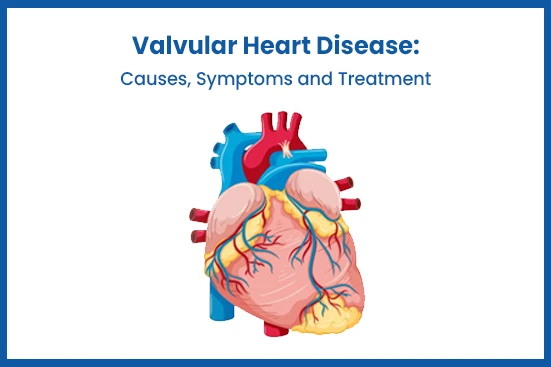Valvular Heart Disease: Causes, Symptoms and Treatment
What is valvular heart disease?
Valvular heart disease occurs when any of the heart valves sustain damage or become diseased, and there are various causes for this condition.
In this disorder, one or more heart valves fail to function properly. The heart comprises four valves, crucial for maintaining the correct direction of blood flow. When a valve fails to open or close fully, it disrupts the normal blood flow through the heart to the rest of the body.
The heart valve disease treatment varies depending on the specific valve affected and the severity and type of the disease. In certain cases, surgery may be necessary to either repair or replace the affected heart valve.
What causes valvular heart disease?
Understanding how the heart functions may help you know the heart valve disease cause. Four heart valves keep blood flowing in the appropriate way. These are the valves:
- Mitral valve
- Aortic valve
- Tricuspid valve
- Pulmonary valve
Each valve has flaps known as leaflets or cusps. Each heartbeat causes the flaps to open and close once. When a valve flap fails to open or seal properly, less blood flows from the heart to the rest of the body.
Types of heart valve disease include:
- Stenosis: The valve flaps thicken or stiffen and might sometimes connect together. The opening of the valve narrows. The narrowed valve allows less blood to pass through it.
- Regurgitation: Because the valve flaps may not close tightly, blood can pass backward.
- Prolapse: The valve flaps stretch out and become floppy. They bulge backward like a parachute. This disease may result in regurgitation.
- Atresia: This occurs when the valve is not properly formed, leading to the obstruction of blood flow between the heart chambers. Typically, this variant impacts the pulmonary valve, with a solid sheet of tissue blocking the natural passage of blood.
Some people have heart valve problems from birth. This is referred to as congenital heart valve disease. Adults can, however, develop heart valve disease. Infections, age-related changes, and other heart disorders can all contribute to adult heart valve disease.
What are the signs of valvular heart disease?
Individuals with heart valve problems may not have symptoms for several years. When valvular heart disease symptoms appear, they may include:
- Shortness of breath
- Fainting
- Fatigue
- Dizziness
- Irregular heartbeat
- Chest pain
- Swelling of the ankles and feet

Consult Cardiologist Now,Before The Condition Worsens!
Risk Factors
There are several factors can increase the chance of developing heart valve disease, including:
- Older age
- Infections, such as blood infections or rheumatic fever
- Heart attack or some types of heart disease
- High blood pressure, diabetes and high cholesterols
What are the treatments for heart valve illnesses?
Effective treatment options for heart valve conditions include:
- Medications aimed toward controlling symptoms and ensuring proper heart function.
- Adoption of coronary heart-healthy way of life adjustments to address heart related conditions.
- Surgical interventions for valve repair or replacement.
It's important to recollect that surgical treatment can be advised even within the absence of symptoms because it is able to keep away from future cardiac problems with the aid of correcting the underlying valve issue.
There are various approaches to heart valve surgical treatment, and which one you choose depends on the specific valve problem and your overall health. In addition, due to the lower risks involved, heart valve repair surgery is usually chosen over valve replacement. You and the medical professional together decide on the specific process.
Best Treatment of Valvular Heart Disease at Medicover Hospitals
Valvular Heart Disease is treated at Medicover Hospitals with a commitment to excellence and personalized care. Our skilled team of cardiologists uses cutting-edge diagnostic technology to accurately determine the severity and type of the valve disease. From medication management to better surgical procedures, we prioritize our patient's health. Our comprehensive approach ensures that people with Valvular Heart Disease receive high-quality care, with a focus on efficacy and patient comfort. Choose Medicover Hospitals for a holistic and best treatment experience.